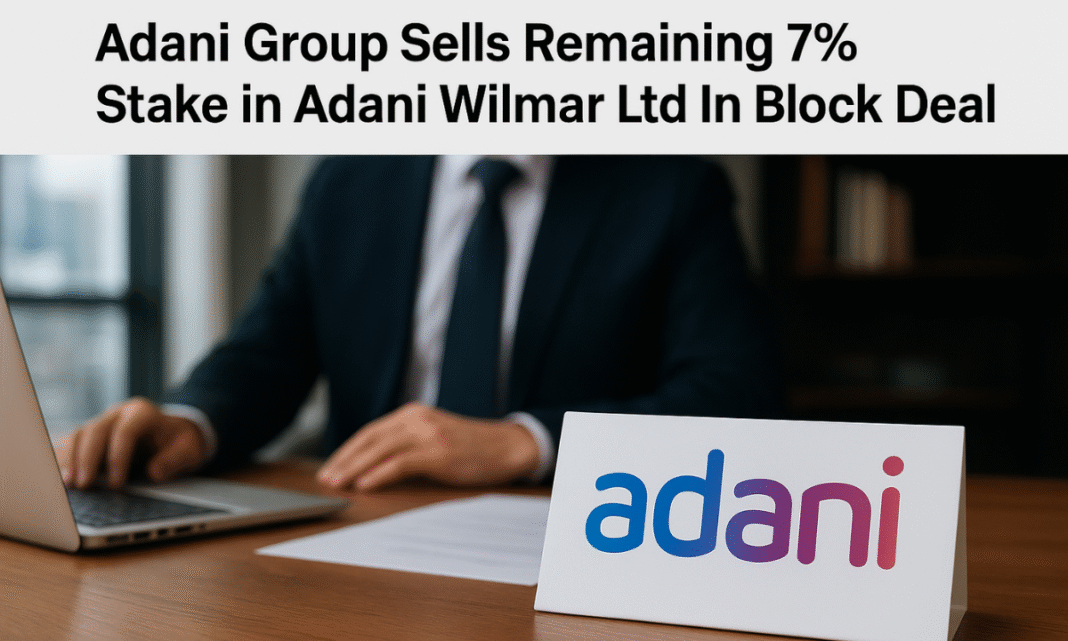In a major development, the Adani Group has sold its remaining 7% stake in Adani Wilmar Ltd through a large block deal. This marks the end of its joint venture with Singapore-based Wilmar International. The transaction represents the Adani Group’s gradual exit from the FMCG and edible oils business. Now, the company can focus more on infrastructure, energy, and green transition sectors.
The block deal, executed on the stock exchanges, drew strong interest from institutional investors and long-term funds. Market analysts pointed out that despite market volatility, demand for Adani Wilmar shares remained strong. This reflects the company’s solid brand presence, broad distribution network, and deep reach in India’s fast-growing food essentials sector.
A Gradual Exit Strategy Now Completed
Over the past year, the Adani Group has been reducing its stake in Adani Wilmar as part of its capital allocation priorities. The sale of the final 7% ends its partnership in the FMCG space. While the Group contributed significantly to the brand’s early growth, Wilmar International now fully manages and operates the company. Wilmar is one of Asia’s top agribusiness players.
Industry experts see this move as part of a larger plan by the conglomerate to streamline operations and invest in high-growth areas like renewable energy, airports, infrastructure development, green hydrogen, and logistics. For Adani, exiting frees up resources to boost expansion in these key sectors.
Impact on Adani Wilmar
Adani Wilmar Ltd, known for brands like Fortune, remains a strong player in edible oils and is quickly expanding into packaged foods, staples, and value-added FMCG categories. The company has diversified its product range to include flour, pulses, rice, ready-to-cook items, and specialty fats. Despite rising prices in the edible oil market, the brand has kept its leading position and continues to grow in India and beyond.
Analysts believe the Adani Group’s complete exit will not affect operations since Wilmar International is committed to the company’s long-term growth and independence. The market views this development as a step toward improved clarity and stability.
Stock Market Reaction
The block deal spurred increased trading in Adani Wilmar’s stock, though price changes stayed within expected limits. Investors welcomed the clarity from the end of Adani’s divestment, anticipating that strategic decisions and expansion plans will now be smoother under Wilmar’s control.
Market watchers think that with Adani’s exit complete, the company may attract more global funds interested in India’s fast-growing FMCG sector.
Focus Realignment for the Adani Group
This move aligns with the Adani Group’s focus on strengthening its balance sheet, optimizing capital allocation, and creating long-term value in priority sectors. In the past two years, the Group has invested heavily in:
– Renewable energy and green hydrogen
– Port and logistics expansion
– Airport modernization
– Data centers and digital infrastructure
– Transmission and distribution networks
With rising energy demand and India’s push for carbon neutrality, Adani aims to be a prominent player in sustainable infrastructure.
Outlook
The divestment marks a critical moment for both companies. For Adani, it wraps up a strategic shift toward core sectors that promise scalable, long-term returns. For Adani Wilmar, it provides a clearer corporate structure under Wilmar’s leadership, allowing for a continued focus on innovation, FMCG expansion, and market consolidation.
As this chapter closes, both entities look well-prepared to pursue growth—Adani in infrastructure and green energy, and Adani Wilmar in food essentials and FMCG.


